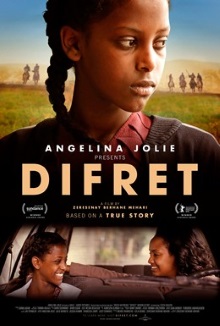
I don’t believe I’ve ever watched an Ethiopian film before so it’s good at least to try something new. Though it prominently features Angelina Jolie’s name, her role is that of executive producer only which I take to mean that she helped to fund and perhaps the market the film. Most of the cast and crew including the director Zeresenay Berhane Mehari seems to be Ethiopian.
Hirut Assefa is a 14-year-old girl who lives in a farm three hours outside of Addis Ababa. One day while walking home from home, she is abducted by a group of men riding horses and wielding rifles. They bring her to a hut and that night she is raped by one of the men. The next morning he announces that she is now his wife. Hirut manages to sneak out and take a rifle with her. While being pursued, she shoots and kills the man who raped her and is arrested by the police. Meaza Ashenafi, an activist with an NGO which provides legal aid for women, hears of plight and decides to help her. Meanwhile back in her home village, the family of the dead man insists that she be killed as punishment as they maintain that abducting girls to become brides is part of their tradition.
It’s a worthy subject and Jolie’s involvement is a surefire giveaway of its feminist message. Unfortunately this is a completely straightforward, by-the-numbers presentation of events with almost no artistic flair whatsoever. The performers aren’t exactly bad, but they don’t emote all that well either. The end result is that, yes, you do learn about the abominable traditions of bride abductions and agree that the NGO did a good job in fighting against that but you don’t really get emotionally worked up over it. You do empathize with Hirut but only on a very abstract level. The film never does much to distinguish her as a person and indeed there seems to be some truth in the claim that Ashenafi seems her less as a person in her own right than as the perfect opportunity to fight the battle she has always wanted to fight. That could be an interesting angle too but the film doesn’t make much of it.
Similar missed opportunities abound in the film. Ashenafi confronts the prosecutor on more than one occasion, trying to get him to switch to her side but the conversations all pretty much play the same way. In the film, he seems motivated more by spite than anything else. Perhaps it might have been wiser to delve more into why the government is reluctant to contradict the customary courts? The film also seems to dangle a hint that Ashenafi is romantically involved with a journalist. Since nothing comes out of it, it seems better to either leave it out entirely or use it as a way to better develop our understanding of her character. Given the paucity of films set in Ethiopia, I was also looking forward to some shots of the capital city but it turned out that you only get a few street-level shots, probably due to budgetary constraints and the fact that it is set in the 1990s.
Still, it’s kind of cool to at least watch one Ethiopian film. I think some of the most interesting scenes to us were those showing them eating. But this is just not a very good film and as worthy as this cause is, you would probably learn more about it by reading a decent article on the subject. As such, I find it difficult to recommend it to anyone.